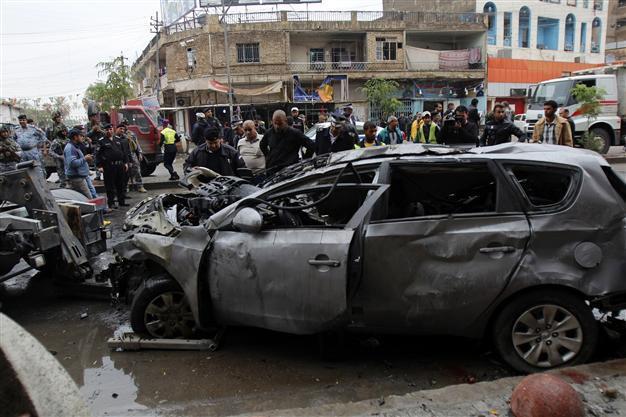Iraq car bomb kills 30 as year's death toll tops 5,800
BAQUBA, Iraq - Agence France-Presse

Residents gather at the site of a car bomb attack in Baghdad November 20, 2013. REUTERS Photo
A car bomb ripped through a packed food market north of Baghdad on Thursday, killing 30 people, as Iraq's death toll for 2013 from a surge in violence nationwide capped 5,800.
The rise in unrest has forced Baghdad to appeal for international help in fighting the country's worst bloodshed since 2008, just months before Iraq's first parliamentary elections in four years.
Officials, meanwhile, have voiced concerns over a resurgent Al-Qaeda emboldened by the civil war in neighbouring Syria that has provided the terror network's front groups increased room to plan and carry out attacks in Iraq.
Thursday's attack came a day after a spate of violence across the country, including a wave of bombings in the capital, killed 59 people and left more than 100 wounded, marking Iraq's deadliest day this month.
The latest explosion went off at around noon (0900 GMT) near a cafe in a food market in the town of Saadiyah, which lies northest of Baghdad in restive ethnically-mixed Diyala province.
At least 30 people were killed and 40 others wounded in the blast, according to a police colonel and a doctor, both speaking on condition of anonymity.
Saadiyah is populated mostly by Faylis, or Shiite Kurds, and lies within a tract of disputed territory claimed by both the central government and Iraq's autonomous Kurdish region.
Militants frequently exploit poor communication between the two sides' security forces to carry out attacks.
On November 14, a suicide bomber targeted a group of Shiite pilgrims in the town on the anniversary of the death of a venerated figure in Shiite Islam, killing 32 people.
Also on Thursday, officials in Diyala said they had recently found the bodies of a dozen residents snatched by a group of people purporting to be members of the security forces.
The 12 were executed and their bodies had been thrown into a nearby river, reminiscent of targeted killings that were rampant during the worst of Iraq's sectarian bloodshed in 2006 and 2007.
No group has claimed responsibility for the violence, but Sunni militants linked to Al-Qaeda often carry out such attacks, ostensibly to undermine confidence in the Shiite-led government and security forces.
"Their capability to conduct attacks has increased," Deputy National Security Adviser Safa Hussein told AFP in a recent interview, referring to the Islamic State of Iraq and the Levant, an Al-Qaeda front group.
"By now they understand they can't realise their ambition in establishing a state. Nor can they defeat the government.
"But they can work towards their goal in establishing indirect control in some of the areas, and making the state a failed state, which is a very good environment for them to flourish." The unrest is part of a surge in bloodshed that has pushed violence to its highest level since 2008, when Iraq was recovering from the worst of its Sunni-Shiite sectarian war.
More than 5,800 people have been killed so far in 2013, according to an AFP tally based on reports from security and medical officials.
Prime Minister Nuri al-Maliki has called for Washington's help in the form of greater intelligence sharing and the timely delivery of new weapons systems.
But diplomats and analysts say the government is not doing enough to address the root causes of the unrest, particularly frustration within the Sunni Arab minority, which complains of mistreatment by the Shiite-led authorities.
With elections due on April 30, officials fear the level of violence could rise further as militants seek to destabilise the country ahead of the polls.
In addition to failing to stem the bloodshed, authorities have also struggled to provide adequate basic services such as electricity and clean water, and corruption is widespread.
